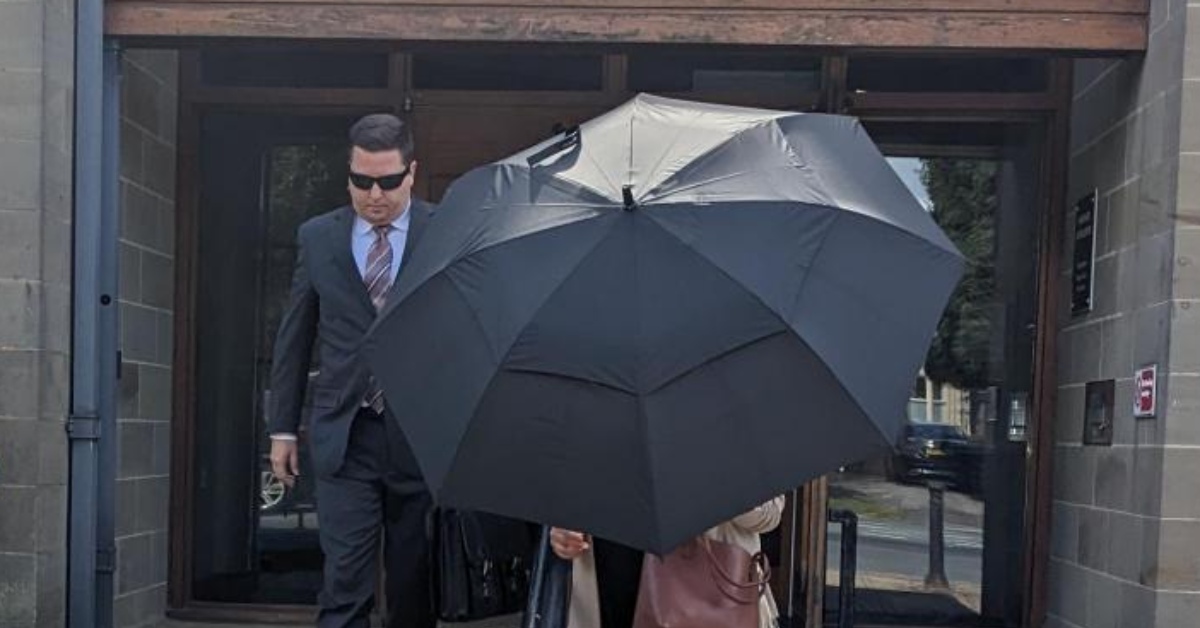Pentagon officer found not guilty in Harrogate schoolboy crash
Benjamin Oakes (left) leaving a previous court appearance in Harrogate. A US colonel has been cleared of causing serious injury by careless driving following a horrific road crash in which two Harrogate[1] schoolboys were badly injured. Benjamin Oakes, 46, was in a white Vauxhall Astra which pulled out of a junction at the end of the driveway outside Ashville College and collided with the back end of a Ford Ranger pick-up truck, York Magistrates' Court heard.
The Ford Ranger, driven by Sam Goodall, had swerved in an attempt to avoid the Astra, which clipped the back of his vehicle. It caused the truck to spin and career across the road, where it mounted a pavement on the opposite side of Yew Tree Lane into the path of two teenagers who were walking along the footpath. The truck struck both boys and ploughed through a wall at the edge of the college grounds.
Prosecutor Louise Berry said that at least one of the boys, who were both 15 at the time, was "buried under the debris" and both were seriously included. One of them suffered a horrific leg injury after the truck went "three-quarters way through the wall".
Months in hospital
Giving evidence, one of the boys, who can't be named for legal reasons, said: "We got hit through the wall.
I think I got knocked out for a bit. We were in the bushes. I just heard (his friend) scream."
The boy said the truck hit him and he went onto its bonnet before hitting the wall. He said a large piece of wall landed on his left leg. The teenager, now 16, said he looked over to his friend who saw his own badly injured leg and started screaming and saying he was going to die.
The boys spent 18 weeks and 22 weeks in hospital respectively. One of them needed extensive operations following the collision at about 8.30am on February 2. Ms Berry said it was the Crown's case that Mr Oakes, of Tewit Well Avenue, Harrogate, had caused the accident because he hadn't checked that the way was clear before pulling out of the junction.
She said Mr Oakes' Astra had been "edging" out of the junction before pulling out completely into the path of the Ford Ranger.

Benjamin Oakes Mr Oakes, chief of the space policy division for the US joint chiefs of staff at the Pentagon, was charged with two counts of causing serious injury by careless driving but denied the allegations. Yesterday, following a two-day trial, district judge Adrian Lower found the US military chief not guilty of both charges.
A female motorist who witnessed the collision described Mr Oakes' driving in the moments before the crash as "aggressive and inpatient".
She said he appeared to be "in a rush to leave the junction" before the collision with the pick-up driven by Mr Goodall, who said that following the crash Mr Oakes told him: "I didn't see you." She said she thought the Astra had pulled out "a bit too early...and that's what caused him to hit the back of the truck". She added:
"I felt like the truck just appeared out of nowhere in the opposite lane to me." She then looked to her right and saw the two schoolboys walking along the footpath. She said:
"The truck was in the wall, so I knew it had gone into (the boys). "I thought at the time that the truck was going really quick. I got out of the car...and saw that the Astra was damaged as well.
I think we were all in shock."
'No conclusive evidence'
Peter Minnikin, Mr Oakes' lawyer, said that neither his client, the female motorist nor the injured boys had seen the truck as it approached the "blind" junction and suggested it could have been travelling too fast. District judge Adrian Lower said he had "no doubt that this was a traumatic, extremely painful experience for (the two schoolboys)" but that he had to consider the case dispassionately. He noted that it was "extremely difficult" for motorists to turn right at the "blind" junction, partly due to a pillar or old gatepost at the end of the driveway.
He said there was "no conclusive evidence" that the truck had been travelling too fast or above the speed limit. Mr Lower, who noted that Mr Oakes had been driving in the UK without incident for four years, said there was every possibility that the truck wasn't visible to any of the motorists or witnesses even after Mr Oakes had pulled out of the junction. He said that for those reasons he couldn't be satisfied that Mr Oakes' driving was careless or fell below the standard of a competent driver.
Mr Lower found Mr Oakes not guilty on both counts and made an order for the defendant's costs to be paid from public funds.